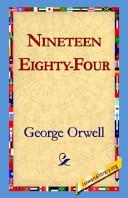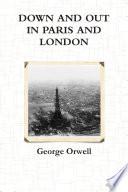Works

Keep the Aspidistra Flying
George Orwell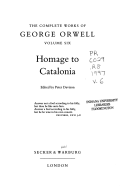
Homage to Catalonia
George Orwell
Politics and the English Language
George Orwell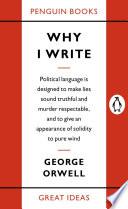
Why I Write
George Orwell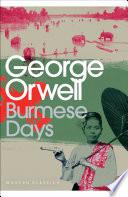
Burmese Days
George Orwell
England Your England
George Orwell
Coming Up for Air
George Orwell
A Clergyman's Daughter
George Orwell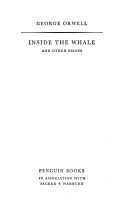
Inside the Whale and Other Essays
George Orwell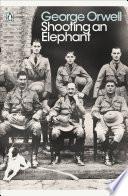
Shooting an Elephant
George Orwell
The Road to Wigan Pier
George OrwellA Hanging
George OrwellFamous George Orwell Quotes
"Politics and the English Language" (1946)
Context: Political language — and with variations this is true of all political parties, from Conservatives to Anarchists — is designed to make lies sound truthful and murder respectable, and to give an appearance of solidity to pure wind.
“They fear love because it creates a world they can't control.”
Source: 1984
George Orwell Quotes about people
This is often attributed to George Orwell book 1984. We cannot find it inside. Perharps this is post-mortem paraphrase of his quote "Who controls the past controls the future; who controls the present controls the past".
“If liberty means anything at all, it means the right to tell people what they do not want to hear.”
Sometimes paraphrased as "Liberty is telling people what they do not want to hear."
Variant: Freedom is the right to tell people what they do not want to hear.
Source: Original preface to Animal Farm; as published in George Orwell: Some Materials for a Bibliography (1953) by Ian R. Willison
"London Letter" (December 1944), in Partisan Review (Winter 1945)
“Poverty frees them from normal standards of behaviour, just as money frees people from work”
Source: Down and out in Paris and London (1933), Ch. 1
Source: Down and Out in Paris and London
Context: The Paris slums are a gathering-place for eccentric people — people who have fallen into solitary, half-mad grooves of life and given up trying to be normal or decent. Poverty frees them from normal standards of behaviour, just as money frees people from work. Some of the lodgers in our hotel lived lives that were curious beyond words.
George Orwell: Trending quotes
“History is written by the winners.”
"As I Please" (1943–1947)
Context: During part of 1941 and 1942, when the Luftwaffe was busy in Russia, the German radio regaled its home audience with stories of devastating air raids on London. Now, we are aware that those raids did not happen. But what use would our knowledge be if the Germans conquered Britain? For the purpose of a future historian, did those raids happen, or didn't they? The answer is: If Hitler survives, they happened, and if he falls they didn't happen. So with innumerable other events of the past ten or twenty years. Is the Protocols of the Elders of Zion a genuine document? Did Trotsky plot with the Nazis? How many German aeroplanes were shot down in the Battle of Britain? Does Europe welcome the New Order? In no case do you get one answer which is universally accepted because it is true: in each case you get a number of totally incompatible answers, one of which is finally adopted as the result of a physical struggle. History is written by the winners.
Part II : Shopkeepers At War, § II
The Lion and the Unicorn (1941)
George Orwell Quotes
This has commonly been attributed to Orwell but has not been found in any of his writings. Quote Investigator http://quoteinvestigator.com/2011/11/07/rough-men/ found the earliest known appearance in a 1993 Washington Times essay by Richard Grenier: "As George Orwell pointed out, people sleep peacefully in their beds at night only because rough men stand ready to do violence on their behalf." The absence of quotation marks indicates Grenier was using his own words to convey Orwell's opinion; thus it may have originated as a paraphrase of his statement in "Notes on Nationalism" https://www.mtholyoke.edu/acad/intrel/orwelnat.htm (May 1945): "Those who "abjure" violence can only do so because others are committing violence on their behalf." There are also similar sentiments expressed in an essay which Orwell wrote on Rudyard Kipling, quoting from one of Kipling's poems: "Yes, making mock o' uniforms that guard you while you sleep." In the same essay Orwell also wrote of Kipling: "He sees clearly that men can only be highly civilized while other men, inevitably less civilized, are there to guard and feed them."
Misattributed
“Perhaps a man really dies when his brain stops, when he loses the power to take in a new idea.”
Source: Coming Up for Air, Part 3, Ch. 1
“Trust a snake before a Jew and a Jew before a Greek, but don't trust an Armenian”
Source: Down and out in Paris and London (1933), Ch. 13
Source: Down and Out in Paris and London
Context: I only realized during my last week that I was being cheated, and, as I could prove nothing, only twenty-five francs were refunded. The doorkeeper played similar tricks on any employee who was fool enough to be taken in. He called himself a Greek, but in reality he was an Armenian. After knowing him I saw the force of the proverb "Trust a snake before a Jew and a Jew before a Greek, but don't trust an Armenian."
"As I Please," Tribune, (31 December 1943)
As I Please (1943–1947)
“Man serves the interests of no creature except himself.”
Source: Animal Farm
"Lear, Tolstoy and the Fool," Polemic (March 1947) - Full text online http://orwell.ru/library/essays/lear/english/e_ltf]
A Clergyman's Daughter, Ch. 2 (1935)
Part I : England Your England, § IV
The Lion and the Unicorn (1941)
"As I Please," Tribune (8 December 1944)<sup> http://alexpeak.com/twr/tdoaom/</sup>
"As I Please" (1943–1947)
Context: The important thing is to discover which individuals are honest and which are not, and the usual blanket accusation merely makes this more difficult. The atmosphere of hatred in which controversy is conducted blinds people to considerations of this kind. To admit that an opponent might be both honest and intelligent is felt to be intolerable. It is more immediately satisfying to shout that he is a fool or a scoundrel, or both, than to find out what he is really like. It is this habit of mind, among other things, that has made political prediction in our time so remarkably unsuccessful.
"The Prevention of Literature" (1946)
Context: A totalitarian state is in effect a theocracy, and its ruling caste, in order to keep its position, has to be thought of as infallible. But since, in practice, no one is infallible, it is frequently necessary to rearrange past events in order to show that this or that mistake was not made, or that this or that imaginary triumph actually happened. Then, again, every major change in policy demands a corresponding change of doctrine and a revaluation of prominent historical figures.
Source: Down and out in Paris and London (1933), Ch. 3
Context: For, when you are approaching poverty, you make one discovery which outweighs some of the others. You discover boredom and mean complications and the beginnings of hunger, but you also discover the great redeeming feature of poverty: the fact that it annihilates the future. Within certain limits, it is actually true that the less money you have, the less you worry. When you have a hundred francs in the world you are liable to the most craven panics. When you have only three francs you are quite indifferent; for three francs will feed you till tomorrow, and you cannot think further than that. You are bored, but you are not afraid. You think vaguely, 'I shall be starving in a day or two--shocking, isn't it?' And then the mind wanders to other topics. A bread and margarine diet does, to some extent, provide its own anodyne. And there is another feeling that is a great consolation in poverty. I believe everyone who has been hard up has experienced it. It is a feeling of relief, almost of pleasure, at knowing yourself at last genuinely down and out. You have talked so often of going to the dogs--and well, here are the dogs, and you have reached them, and you can stand it. It takes off a lot of anxiety.
Variant: All animals are equal, but some animals are more equal than others.
Source: Animal Farm
“The further a society drifts from truth, the more it will hate those who speak it.”
This has been attributed to Orwell on the internet, but the earliest source citing him as author appears to be a post from Jsnip4 on the RealistNews.net forum (15 February 2011) http://www.realistnews.net/Thread-realist-news-was-the-capital-gains-tax-just-removed-regarding-bullion. Prior to this, the statement occurred, without attribution to Orwell, in an opinion piece by columnist Selwyn Duke http://www.renewamerica.com/columns/duke/090506, "Stopping Truth At The Border: Banning Michael Savage From Britain" (6 May 2009) https://web.archive.org/web/20150701002957/http://www.conservativecrusader.com/articles/stopping-truth-at-the-border-banning-michael-savage-from-britain.
Misattributed
Source: Down and out in Paris and London (1933), Ch. 2, Charlie
Homage to Catalonia (1938)
Source: Keep the Aspidistra Flying (1936), Ch.3
Source: Review of Hunger and Love by Lionel Britton, in The Adelphi (April 1931)
Source: Review of Zest for Life by Johann Wöller, in Time and Tide (17 October 1936)
Source: "As I Please," Tribune (4 August 1944)
http://alexpeak.com/twr/orwell/quotes/
“But it takes a war to make map-reading popular.”
Source: "As I Please," Tribune (11 February 1944)
Review of A Coat of Many Colours: Occasional Essays by Herbert Read, Poetry Quarterly (Winter 1945)
Context: Each generation imagines itself to be more intelligent than the one that went before it, and wiser than the one that comes after it. This is an illusion, and one should recognise it as such, but one ought also to stick to one's own world-view, even at the price of seeming old-fashioned: for that world-view springs out of experiences that the younger generation has not had, and to abandon it is to kill one's intellectual roots.
“If you want to keep a secret, you must also hide it from yourself.”
Variant: For the first time he perceived that if you want to keep a secret you must also hide it from yourself.
Source: 1984
“But if thought corrupts language, language can also corrupt thought.”
"Politics and the English Language" (1946)
Source: 1984
Context: But if thought corrupts language, language can also corrupt thought. A bad usage can spread by tradition and imitation even among people who should and do know better.
Context: All issues are political issues, and politics itself is a mass of lies, evasions, folly, hatred, and schizophrenia. When the general atmosphere is bad, language must suffer. I should expect to find — this is a guess which I have not sufficient knowledge to verify — that the German, Russian and Italian languages have all deteriorated in the last ten or fifteen years, as a result of dictatorship.
But if thought corrupts language, language can also corrupt thought. A bad usage can spread by tradition and imitation even among people who should and do know better.
"Why I Write," Gangrel (Summer 1946)

